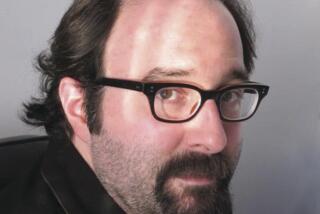Twenty Years Later, ‘E.T.’ Still Brings It All Home
“E.T.” is back, and that has to be a good thing.
Hugely popular with audiences and critics on its initial release, “E.T. The Extra-Terrestrial” (to give it its full name) is being reissued in a special 20th anniversary edition that features, we are assured, “never-before-seen footage, state-of-the-art computer-generated enhancements and a digitally remixed soundtrack.”
Impressive as all this is, it’s a bit beside the point. Unlike “Apocalypse Now Redux,” which had 49 new minutes, the unseen footage here, amusing though it is, lasts a bit more than three minutes. And a new “E.T.” is not exactly what’s called for; what we want is to have the old one back so we can take pleasure in it one more time. Which is, thankfully, pretty much what has happened.
For if looking at “Apocalypse Now” a second time reminds us of how much we’ve changed, seeing “E.T.” again reminds us of how much we’ve remained the same, how gratified we still are by a film that connects so beautifully to our sense of wonder and joy.
Movies that become classics tend to have a confidence about them, a sureness that they have something that will last, and this is the case with “E.T.” There’s a naturalness, even an inevitability about the film’s story line, a narrative pull that draws us in again even though we know exactly what is going to happen.
This is due in large measure to Steven Spielberg. Not surprisingly, the director says in his introduction to the first printing of Melissa Mathison’s marvelous screenplay in “E.T. The Extra-Terrestrial: From Concept to Classic” that “E.T. was--and still is--my most personal film.”
Connected to his great love of science fiction, his gift for working with children and, he admits in that introduction, his parents’ divorce, “E.T.” feels like one from the director’s heart, a film he had the confidence he could hit out of the park. Though the best picture-writer-director Oscars all went to “Gandhi” that year, it’s this film that endures.
Of course, Spielberg had great help, starting with that Mathison script, which, along with Steven Zaillian’s for “Schindler’s List,” has to be one of the best he’s ever had. Aside from funny lines and situations, Mathison created a genuine, unforced warmth on the page that is as effective on screen as it’s ever been.
A re-viewing of the film also reminds us how beautifully constructed it is, the effortless way multiple incidents are worked into what is basically a very simple story line, and how carefully worked out are sequences like E.T. communicating that what he really wants to do is phone home.
“E.T.” is also quite brilliantly cast, so much so that it’s impossible to think of anyone but Drew Barrymore as the tiny dynamo Gertie or to even imagine the earnest, ever so serious Elliott, the boy who wails, “He came to me,” as being played by someone besides Henry Thomas.
Barrymore and Thomas have had sizable adult careers (she was recently in “Riding in Cars With Boys”; he will be in “Gangs of New York”), and Erika Eleniak, the girl Elliott kisses, grew up to became a star on “Baywatch.” But because they moved from child to adult as opposed to adult to older adult (as happened to the actors in “Apocalypse Now”), the change in their appearances doesn’t throw us out of the movie.
Similarly, though special effects have advanced mightily in the past two decades, E.T., like “Forbidden Planet’s” Robby the Robot, is an icon we love just the way he is. Seeing the film again reminds us how miraculous it was that the contributions of dozens of people--from Caprice Rothe, the mime who did the hands, to Pat Welsh, who recorded E.T’s dialogue, to the 12 animatronic operators and the little people inside the suit--coalesced to form a creature as individual as it was completely believable.
But no matter how much you know about how “E.T.” was put together, reason and knowledge recede in the face of still-breathtaking moments like Elliott’ s bicycle suddenly taking flight. To see “E.T.” again is to wish you could see it for the first time, or, if not that, take somebody who can.
In general release.
More to Read
Only good movies
Get the Indie Focus newsletter, Mark Olsen's weekly guide to the world of cinema.
You may occasionally receive promotional content from the Los Angeles Times.











